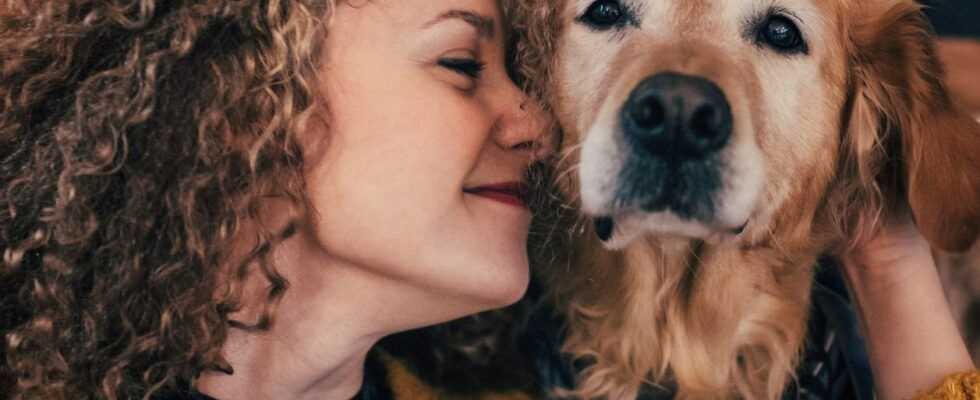Losing your loyal pet can be a real emotional shock. Between the quest for remembrance and the need to move forward, mourning is as difficult to apprehend as the loss of a loved one, even if it does not confuse everything.
Whether his name is Flocon or Kiki, the loss of a pet is often a real tragedy. And no shame in feeling emotions during this heartbreaking stage: it is quite natural. No hierarchy of feelings to make, your pain does not have to be less for a non-human being. And a path towards mourning must also be led for a furry or feathered companion. "The death of a pet can affect us much more intensely than that of a 'loved one', confirms Didier Havé, psychologist and psychotherapist specializing in anxiety and post-traumatic stress, because one can have rather distant bonds with members of his family and a bond felt as 'intimate' with an animal. It all depends on how these relationships are invested ". It must be said that our animals, too, feel emotions, and can show them to us sometimes more clearly than humans. Didier Havé says: "A patient told me how her dog had put its muzzle on the knees of her son for a few moments, then her daughter, then her husband and finally on her before going to bed in a corner to die there shortly after. . What a wonderful display of love and gratitude! ", he adds. But once the companion is gone, how to overcome the ordeal?
See also: Your pet is your best ally against depression
Overcome guilt after losing an animal
Some owners sometimes remain "blocked" because of the traumatic circumstances of the death of the animal. When the latter, for example, is found crushed right next to the home or when he is in pain before leaving. The owners then live with painful images and have countless nightmares. "A lady told me she had flashbacks several times a week of the horrible death of her dog, hit by a car 8 years earlier., explains the psychologist and psychotherapist. She couldn't think of or even refer to this accident without being immediately overwhelmed by distress so intense that no sound could come out of her mouth for several minutes. Imagine reliving the same scene every day just by looking out your window, because that is where the drama happened years before. "
For the specialist, the problem is indeed guilt, which remains a necessary step. We must understand it and thus, gradually overcome it. I should never have let him out! Why didn't I take him to the vet earlier? I should have watched his weight more closely … So many phrases that go on repeat, how many phases to go through. "The fact that a pet depends entirely on us for its food and all of its basic needs puts us in a parental position, Didier Havé analysis. We are fully responsible for its life and survival; it's not just a perception. Suddenly, at the time of death, we carry the immense weight of this responsibility and, even if we reasonably know that we cannot control everything, this responsibility will be transformed into guilt ", details the psychologist. It is therefore on her that we must work, among others.
The different stages of mourning for an animal
Just like a human being, there are different stages of mourning to go through. Didier Havé invites you to consult the work of the American psychologist and animal mourning specialist Thérèse A. Rando, which is structured around 6 stages:
1) Recognize the death.
2) Respond emotionally.
3) Recall the experience of the relationship.
4) Let go of old bonds of attachment.
5) Develop a new relationship with the deceased animal (for example, by imagining it as a star in the sky or an invisible presence watching over us).
6) To be able to reinvest in a new relationship.
"I do not see a fundamental difference between the mourning of an animal and a human, affirms our interlocutor. Grieving is sometimes (poorly) understood. We think this is a way of forgetting, when the reverse is true! It is not about detaching yourself from everything, but about being attached differently to our little companion who is no longer there. The relationship then takes on a new meaning: what was brought by it, the role that this being played in certain periods of our life or even in our identity. "
Taking back an animal right after, good or bad idea?
Once the work has started, certain questions often arise: should we adopt a new animal or not? Is it good to bury your grief by welcoming a new companion? Answer from the specialist: we cannot replace a lost friend with another person, and with animals, the situation is the same. "When you feel ready to welcome a new animal into your home, it is better to be relatively at peace with the idea that this new companion will never replace the one you have lost. A cat does not 'replace' another cat. . It's a different animal, with a different temperament with which we will build a different relationship. ", explains Didier Havé. We must therefore take the time necessary to mourn. The certainty that we can welcome (or not) a new life partner can then be born.
